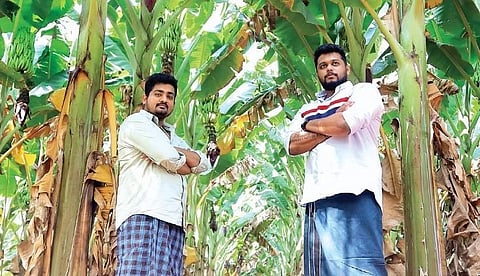

THIRUVANANTHAPURAM: Thiruvananthapuram-based agri-tech startup Greenikk, which claims to be India’s first full-stack banana supply chain, has established a waste-to-value system to improve the country’s banana fibre-based sector by providing a consistent supply of banana stem fibre to entrepreneurs and craftsmen for making high-value goods in domestic and worldwide markets.
As part of the initiative, Greenikk has already made arrangements for providing banana fibre to markets in Tamil Nadu, Karnataka, and Kerala, as well as organising training for micro-entrepreneurs across the three southern states.
Greenikk is also focusing on various home decor products and artefacts made of banana fibre, such as handbags, tote bags, clutches, mats, tableware, tea coasters, serving trays, fruit baskets, flower vases, lamps and shades, and wall decor. There is a strong demand for value-added products in overseas markets such as France, Spain, and the US.
“By creating this waste-to-value chain in the unified banana ecosystem, our focus is on understanding the basic problems in the market and finding viable solutions that would benefit a wide range of industries and crafts using banana fibre,” said Fariq Naushad and Previn Jacob, the Kerala tech duo who have founded the startup.
They stated that a lack of appropriate raw material supply is a major barrier to mechanised banana fibre processing, which is required for the profitable manufacturing of value-added commodities.
To extract 7 kg of fibre, for example, 70 to 80 banana stems must be processed every day, so making the unit profitable with 1 or 2 machines is not possible unless there is an adequate supply of raw material, the founders said.
Another problem is the lack of quality standards and specifications, with each unit preferring a different quality of fibre based on its colour, tensile strength, and cellulose content. The absence of a proper sales channel and a lack of external support for training and design are also adverse factors facing the sector, forcing fibre units to close.
A unit in Ernakulam that had been manufacturing banana-fibre handbags for the past four decades had to halt production due to a shortage of raw material, the Greenikk founders said.
Greenikk, which works with large players in the market like Reshamandi and Extra Weave, has tried to solve these problems by developing a model created by its R&D facility at Theni in Tamil Nadu, a major banana-producing region in south India. The model is based on optimising fibre output while minimising production costs.
“We did testing with 45+ varieties of banana breeds and shortlisted three fibre varieties based on their colour, tensile strength, and cellulose content. The requirements of buyers depend mainly upon these three parameters. Our efforts have resulted in a healthy increase in demand for banana fibre by creating awareness about its prospects across 12 different industries,” they said. It has also created a new D2C (direct-to-consumer) Instagram page under the name greenikk.shop.